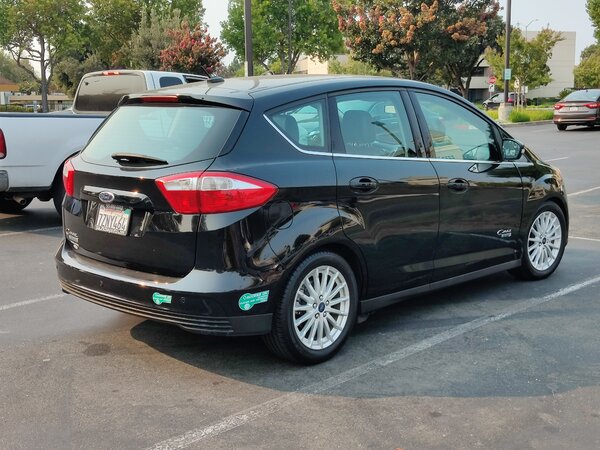-
Posts
12 -
Joined
-
Last visited
Content Type
Profiles
Forums
Gallery
Everything posted by fxo
-
144,000 miles on my 2016 C-Max Energi SEL. I am the second owner. I've owned it since 93,000 , and it just had a few issues. One a cabin air pump, and the other is a auxiliary coolant pump. Overall, the vehicle has been solid otherwise, and I intend to use it as mostly an in-town vehicle as we have 2 other vehicles for the two of us. This vehicle is no Toyota Prius but it is more luxury than that vehicle. If you need lowest cost I am sure the Prius can't be beat. I think one thing that is not well understood out there is, if well cared for, the vehicle's (expensive) battery pack is not a reliability concern, I did think it was, it should not be. I still get 18-19 miles of charge even at these high miles. I may run it another 4 to 5 years and move on to something pure electric.
-
No the fuel mileage should be the same based on whatever high miles on the odo that you are at (assuming the vehicle is perfectly maintained). My HV battery at 144000 miles still delivers 19 miles of EV charge, and I can easily push 50 MPG around town driving. Overall is 38-40MPG if I do lots of highway. 2016 Energi model
-

Are modern autos designed to be expensive to repair?
fxo replied to db22's topic in Lounge: C-MAX Hybrid
The C-Max both Hybrid and Energi are complicated and will cost you plenty to repair, at some point you may just walk away.... especially if the HV battery dies completely. That said Prius has delivered amazing customer experiences (into the 400,000 range and higher), with a relentless push on total , durability and quality. I think that's the thing Toyota has is that mindset of 20 year durability. Ford doesn't care beyond 10 years I think... but Ford does get better with time I think. Nobody is catching Toyota, in fact they may be slipping a bit, based on listening to experts that really know the Toyota mindset at the corporate level.- 15 replies
-
- repairs
- replacement parts
-
(and 2 more)
Tagged with:
-
My 2016 Energi has 143,000 miles on it. I did have the dreaded P0AA6 *(HV system isolation fault) which can be a bad HV battery ($6,000 from Ford just for the battery pack). Instead of a bad HV battery it seems to have been the cabin air pump used to cool the interior and HV battery "box"... they cleared all the codes and since that fix, the vehicle has run several hundreds of miles with out issue. That part was under Ford warranty (as part of the battery and emissions warranty from California CARB, which was 150,000 miles OR 10 years). Whew I was lucky! Ford techs at 3 service/parts places say they replace the HV battery mostly when they have gotten wet because of cabin leaks, or other water damage, or when the vehicle has been in an accident. My battery pack still delivers 19 miles of charge at 143,000 miles on the odometer and 8.5 service years of life. I will drive this till the battery or engine dies mostly likely, till 2030 at least when I want to buy a Rivian R3 at that point. These battery packs should last 100-200K miles I would think. My vehicle is still very fuel efficient, with average driving (plenty of highway) 38 MPG, with mostly electric (around town) I can do much better than that. It is of course a comfortable and practical car as well. Ford made a complicated vehicle but the quality is there. Edited just now by fxo
-
My 2016 Energi has 143,000 miles on it. I did have the dreaded P0AA6 *(HV system isolation fault) which can be a bad HV battery ($6,000 from Ford just for the battery pack). Instead of a bad HV battery it seems to have been the cabin air pump used to cool the interior and HV battery "box"... they cleared all the codes and since that fix, the vehicle has run several hundreds of miles with out issue. That part was under Ford warranty (as part of the battery and emissions warranty from California CARB, which was 150,000 miles OR 10 years). Whew I was lucky! Ford techs at 3 service/parts places say they replace the HV battery mostly when they have gotten wet because of cabin leaks, or other water damage, or when the vehicle has been in an accident. My battery pack still delivers 19 miles of charge at 143,000 miles on the odometer and 8.5 service years of life. I will drive this till the battery or engine dies mostly likely, till 2030 at least when I want to buy a Rivian R3 at that point. These battery packs should last 100-200K miles I would think. My vehicle is still very fuel efficient, with average driving (plenty of highway) 38 MPG, with mostly electric (around town) I can do much better than that. It is of course a comfortable and practical car as well. Ford made a complicated vehicle but the quality is there.
-
My experience finally got resolved. My Ford (Fairfield, CA) guys found an issue with a blown air pump in the vehicle used to cool the HV battery compartment. They fixed this and the P0AA6 faults went away. Which is awesome. Only about 300 miles so far but it is looking good since the P0AA6 were repeating with consistency before this cabin air pump fix. This part because my vehicle has the extended CARB warranty (150k MILES/10 YEARS) was covered by Ford. I was lucky and so far the vehicle is still delivering 19 miles of "EV" charge which is what has always done since I bought it at 90,000 miles. Not sure the battery is so going to be what dies in this thing. I am just going to keep driving it another 5 years (i hope).
-
Mine died this week, at 143,000 .. my son put 48,000 miles on it as a used vehicle. The sad part is that Ford has no HV battery packs in northern California, even if I wanted to replace the battery pack. Cost at the dealer is roughly $8000-9000, but again no parts. The dealer is not saying much they are mum on this issue, I wonder if Dearborn wants it that way. The vehicle is essentially salvage. I wonder what the percentage is that fail between 100,000 and 150,000 (maybe because of bad thermals, or other issues that may be supplier related). The C-Max was a throwaway vehicle for me. Sad!
-
This data in late 2024, looks different now, I think Consumer Reports found some transmissions with issues maybe built around 2015 (MY 2016) and in early 2013 releases, but overall the eCVTs are very reliable. Consumer Reports is stringent with giving out double green arrows. And if you do a bit of research on eCVT from Toyota, these things are iron clad. If Ford used Aisin (Toyota's transmission house) then this should not be a grave concern, outside of what is noted.
-
Current Consumer Reports data show reliability at 5 out of 5 only for the 2016 and 2017 model years of the C-Max. And CR does not differentiate the Energi from Hybrid in its ratings. 2015 rated the worst at 2 out 5. 2013/2014 4 out of 5. And the final year (2018) strangely rated at 3 out of 5. CR won't report unless they have enough respondents.
-
My 2016 C-Max Energi is new to me, it has 95K miles. It seems C-Max's can easily run to 150k miles and probably 200k when properly maintained. Is this true? What are experiences out there in realm of 150K and above? Is the C-Max capable to 200k and even well above? I saw one post about 310k miles on a 2013, with a CVT replacement in between, but what about a post to cover this topic now that the vehicle is exactly 9 years since introduction into the United States in October 2012.
-
I recently bought the 2016 Energi and I am pretty sure from a rather complete carfax report that the CVT has never had a fluid replacement. Is this wise even though the manual says 150K miles for a fluid replacement? What are thoughts on that, change CVT fluid, or wait the vehicle has 94,000 miles on it today. Single owner, basic local commuter from what I could tell. It is my understanding CVT's run quite hot, and am thinking CVT fluid replacement is relatively cheap compared to a CVT replacement of x thousands.


